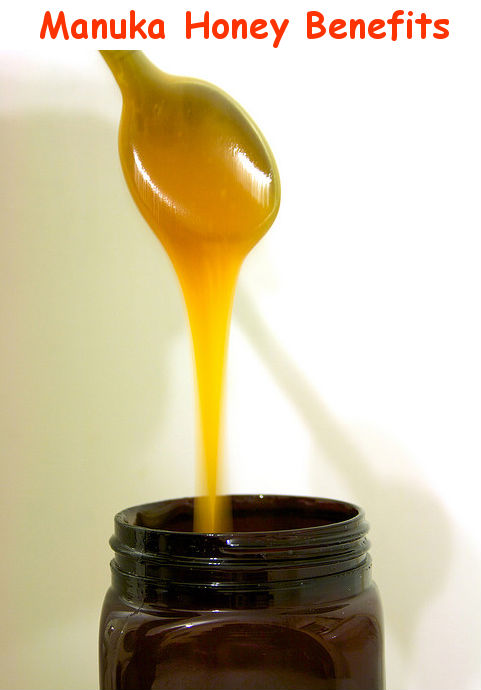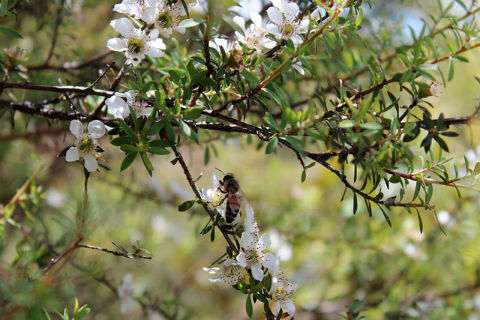Manuka Honey Benefits and Uses

Article Contents:
Manuka honey is a very popular health food today. It is a type of honey that is exclusively harvested in certain parts of Australia and in almost all of New Zealand. Honey has always been recognized as a wonder food as it possesses many health benefits. It can initiate efficient enzyme production while providing a range of other health benefits specific to its users.
What is Manuka Honey?
Manuka honey comes from the produce of the European honey bees that feed on tea trees or manuka trees, which grows freely in New Zealand and South eastern Australia. It has been noted that Manuka honey has the best viscosity among all other types. It also has a very strong flavour and has a physical consistency that is oftentimes described to be oily, herbaceous, and rich. It is quite aromatic and has a slightly bitter flavour.
Like all other honey, manuka honey contains hydrogen peroxide that makes it a very effective antibiotic. But instead of the usual methylglyoxal compound that is found in the other variants, this one contains dihydroxyacetone. Dihydroxyacetone is a substance that is found in the nectar of the flowers of the manuka tree. The high concentration of this substance gives the manuka honey its fairly strong antibiotic effect.
But for a honey to be labelled as Manuka, it has to be potent and therapeutic enough. Its potency is measured by the UMF rating, which stands for Unique Manuka Factor. A minimum rating of 10 UMF is required for any honey obtained from the manuka tree to be certified as an Active Manuka Honey or a UMF Manuka Honey. That would suggest that at least 70% of the pollen should come from the tree itself.
Manuka Honey Benefits and Uses
Manuka honey is currently used for a lot of health conditions. From New Zealand and Australia, it can be shipped worldwide for users to enjoy its different benefits as enumerated below:
1. Treatment for minor burns and wounds
Manuka honey can be applied directly on the top of the wound to speed up the skin’s healing process. This is mostly due to the high antibacterial properties of this particular honey variant.
2. Prevention and treatment of certain cancers
Recent discovery points to the ability of manuka honey to inhibit the growth of cancer cells in the skin, breasts, and colon. As little as 10% manuka honey content can induce cancer
cell apoptosis, or the programmed death of cancer cells.
3. Can decrease high cholesterol content
The natural ingredients found in manuka honey can effectively reduce cholesterol content in the blood. And as it does that, it also makes the heart stronger and more functional.
4. Reduces inflammation
Manuka honey has natural anti-inflammatory properties that can help treat almost all types of infections. Both internal and external inflammations are addressed.
5. For treatment of diabetes
Manuka honey is the ideal sweetener for diabetic patients as it helps stabilize the person’s blood sugar level while effectively controlling their weight, preventing glucose intolerance, and helping patients manage their disease better.
6. For treatment of ear, sinus, and eye infections
Unlike common antibiotics, the antibacterial property of manuka honey works better to help ease infections in the eyes, ears, or sinus area. Bacteria simply fail to adapt resistance to the antibiotics present in honey.
7. For treatment of gastrointestinal problems
Manuka honey aids in the proper digestion of food because of its unique antibacterial properties. It can help address digestive problems like stomach ulcer. The high enzyme content of this honey can aid in the food’s breakdown process.

Manuka Honey and Acne
One of the most popular uses of Manuka honey is for treatment of certain skin disorders like acne. Acne is a skin condition described as the breaking, reddening, or swelling in the skin’s surface. Acne is actually a collective term. Technically, it can be used to refer to pimples, blackheads, whiteheads, and the many other facial skin imperfections.
Manuka honey works best against acne because of its inherent medicinal properties. As described earlier, it has antibacterial, anti-inflammatory and antimicrobial properties. It doesn’t induce any side effects and is very easy to apply.
This type of honey contains hydrogen peroxide that can eliminate skin problems without drying out the surface. As a matter of fact, it acts as an effective moisturizer as it rehydrates the skin layers that were damaged by either bacteria or pollution. The effect is not just an acne-free skin but the kind that glows and radiates a more youthful appearance.
To use manuka honey as a facial treatment for acne-infected skin, simply add a few teaspoons of it to your favourite facial mask and apply normally. Leave it on the skin for 15 minutes before rinsing off with lukewarm water. Then pat the skin dry.
Manuka Honey Contradictions
While Manuka honey seems to be an all-natural treatment therapy for wounds and acnes, some people develop a certain allergic reaction to it. Therefore, people who are allergic to bees and bees-based product should not use manuka honey or any other types of honey for that matter.
Furthermore, it has been discovered that this honey variant can possibly interfere with a certain group of chemotherapy drugs. Patients who are undergoing treatment for cancer are advised to consult with their doctors to determine the proper amount that is safe for them to intake, along with their medicines.